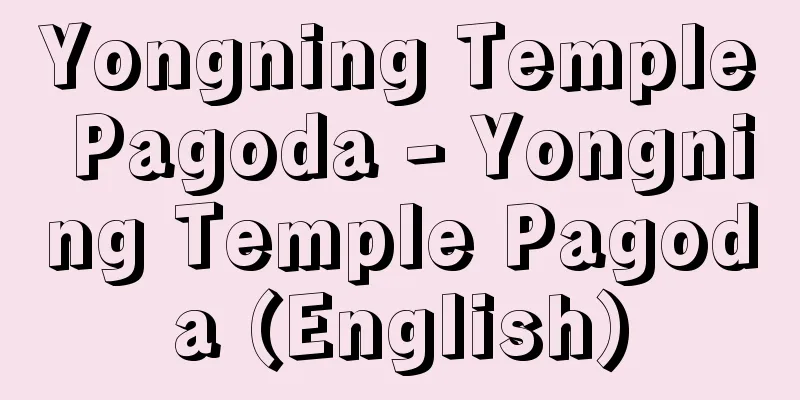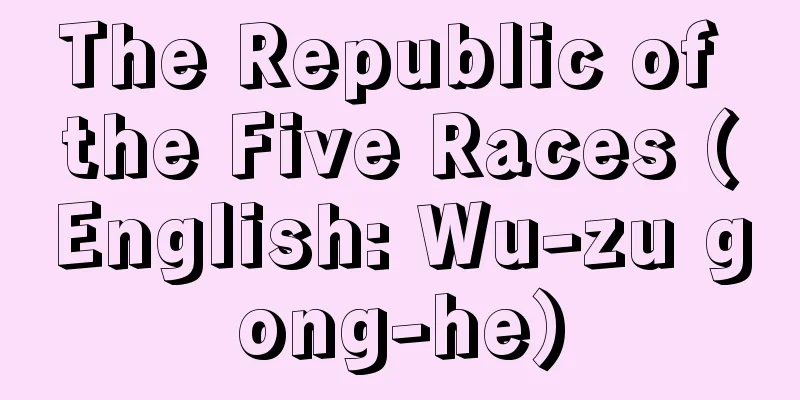Forced labor - Kyoseiroudou

|
Labor that is forced through violence or other means and is not based on the worker's free will. Slave labor in ancient times is a typical example, but even in modern society, there are situations that can be considered forced labor, although to varying degrees, such as "prison cells" or "cottage rooms" in the construction and coal mine industries, or factory dormitories in the textile industry. The Constitution of Japan, first of all, stipulates that citizens cannot be arrested or punished without due process, focusing on the aspect of guaranteeing physical freedom in relation to the state. For example, Article 18 of the Constitution stipulates that "No person shall be held in slavery of any kind, nor shall he be compelled to perform forced labor against his will, except as punishment for a crime." However, in modern society, while tyrants no longer arbitrarily detain or compel their vassals or peasants as in feudal times, there are many cases in which workers are in fact unjustly restrained under the guise of a free agreement between equals. The Labor Standards Act goes further, stating that "Employers shall not force workers to work against their will by means of violence, intimidation, confinement, or other means that unjustly restrict the mental or physical freedom of the workers" (Article 5), and stipulates severe punishment for employers who violate this law, such as "imprisonment for a period of one to ten years, or a fine of 200,000 to 3 million yen" (Article 117). The following are some examples of forced labor by such employers: An incident in which a worker's money and cosmetics were taken away, and when the worker went to bed, his outerwear and underwear were taken away to prevent him from escaping, and he was forced to take customers. An incident in which no violence was used, but the worker was made to work 14 hours a day at a coal mine, with the threat of punishment being imposed if he resisted. Furthermore, the Labor Standards Act prohibits employers from taking advantage of the weak position of workers when they enter into a labor contract by, for example, pre-setting an unreasonably high amount of compensation for damages in the event of breaking a machine or producing a defective product, thereby effectively preventing the worker from quitting (Article 16). It also prohibits employers from offsetting wages against money borrowed in advance by workers, in order to prevent problems such as parents borrowing large amounts of money and workers working without pay (Article 17). It also prohibits employers from forcing workers to save part of their wages (Article 18). An example of large-scale forced labor is the forced labor of Jews by Nazi Germany during World War II. Koreans and Chinese who were forcibly taken by the Japanese military were also forced to do harsh labor. [Hideo Kinoshita and Mikio Yoshida] [Reference] |Source: Shogakukan Encyclopedia Nipponica About Encyclopedia Nipponica Information | Legend |
|
暴行その他によって強制され、労働者の自由意思に基づかずに行われる労働。古代の奴隷労働がその典型であるが、近代社会においても、たとえば建設業、炭鉱などにおける「監獄部屋」「たこ部屋」、あるいは繊維業における工場寄宿舎などで、程度の差こそあれ強制労働とみなされるような状況がみられた。 日本国憲法は、まず国家との関係での身体の自由の保障という面を中心に、適正な手続を経ないで国民を逮捕したり刑罰を加えたりできないと定めている。たとえば憲法第18条は「何人も、いかなる奴隷的拘束も受けない。又、犯罪に因(よ)る処罰の場合を除いては、その意に反する苦役に服させられない。」と定めている。しかし近代社会においては、封建時代のように暴君が恣意(しい)的に家臣、農民を拘禁・使役したりすることはないにしても、対等な者同士の自由な合意という形をとりながら、事実上労働者を不当に拘束するという状態は多々生じうる。そこで労働基準法はさらに具体的に、「使用者は、暴行、脅迫、監禁その他精神又は身体の自由を不当に拘束する手段によつて、労働者の意思に反して労働を強制してはならない。」(5条)と定め、これに違反した使用者には「1年以上10年以下の懲役又は20万円以上300万円以下の罰金」(117条)という厳罰を規定している。 このような使用者による強制労働とみなされた具体例としては次のような例があげられる。労働者の所持金、化粧道具を取り上げ、さらに就寝時に外出着、下着を取り上げて逃亡を防ぎ、客をとらせた事件。暴行は加えなかったが、反抗すればどのような制裁を受けるか知れないような気勢を示して、1日14時間にわたる出炭労働を行わせた事件。 さらに労働基準法は、労働契約を締結する際の労働者の弱い立場につけこんで、たとえば、機械を破損したり不良品を出した場合の損害賠償額を不当に高い額であらかじめ定めておいて、実際上退職できなくすることを禁止している(16条)。また、使用者が、労働者が前借りした金と賃金を相殺することも禁じている。親が多額の金銭を借り労働者が無報酬で働くというような弊害を防ぐためである(17条)。賃金の一部を使用者が強制的に貯金させることも禁じている(18条)。 なお、大規模な強制労働の例としては、第二次世界大戦時におけるナチス・ドイツのユダヤ人に対する強制労働があげられる。日本軍に強制連行された朝鮮人や中国人にも過酷な労働が強いられた。 [木下秀雄・吉田美喜夫] [参照項目] |出典 小学館 日本大百科全書(ニッポニカ)日本大百科全書(ニッポニカ)について 情報 | 凡例 |
<<: Indecent assault - indecent assault
>>: Forced deportation - Kyoseirenko
Recommend
Panipat (English spelling)
...Three important battles in Indian history were...
Crustacea
…the group of animals that make up the phylum Art...
Jacques-Henri Bernardin de Saint-Pierre
1737‐1814 French author. Born in Le Havre in north...
Bodhi tree
... The bodhi tree, under which Shakyamuni attain...
Basic Converter Process
…A basic refractory lining was required. Thus Tho...
Lockyer - Joseph Norman Lockyer
British astronomer. Discoverer of helium in the s...
Canalo
Argentine tango band leader and composer. He taugh...
Xie Fangde - Shabouto
A scholar from the Song Dynasty in China. His pen...
Propositional logic
In modern logic, this is the field that deals wit...
Bell sound - Kanenone
The title of a Kyogen piece. Tarokaja Kyogen. The...
Prefectural Ordinance Collection - Kenreishuuran
A book that records the composition of the Edo Sho...
Anrakuin - Anrakuin
…In 1679 (Enpo 7), at the age of 13, he served Ic...
Nitromethane
CH 3 NO 2 (61.04). It can be obtained by heating ...
Regional Plan Association
…In line with this proposal, the British governme...
Cotton, A.
...This is the phenomenon in which, when right-ha...









